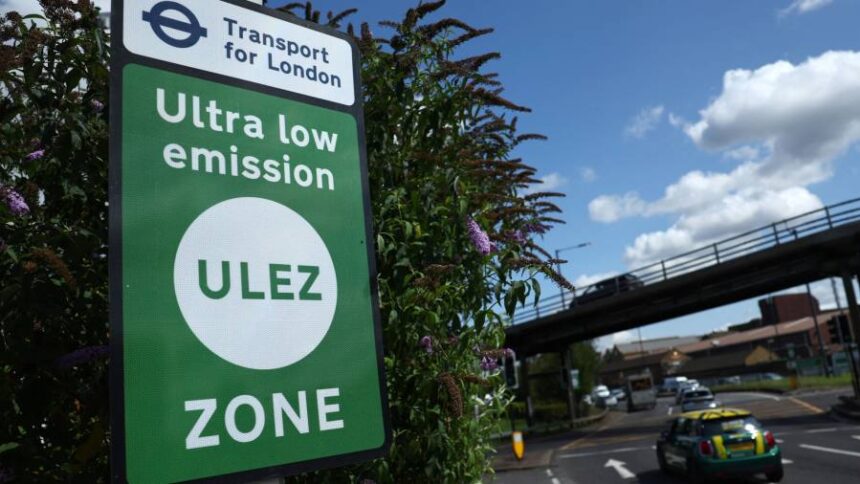Receive free UK politics updates
We’ll send you a myFT Daily Digest email rounding up the latest UK politics news every morning.
Tradespeople driving polluting vehicles in London’s controversially expanding low-emissions zone can offset the charge against tax, in a major loophole to mayor Sadiq Khan’s flagship clean air scheme.
The ultra low emission zone will be extended to all of Greater London from Tuesday, in a move that has prompted fierce opposition from drivers in some of the city’s outer neighbourhoods. The policy was blamed for the Labour party’s failure to win the Uxbridge by-election last month.
Motorists with vehicles that fall short of emissions standards will have to pay a £12.50 daily charge to drive into the Ulez. The fee generally applies to petrol engine vehicles built before 2006 and diesel ones built before 2016, and includes people driving into the zone for work.
But the Greater London Authority told the Financial Times that self-employed workers would be able to claim back the fee as part of their tax return if the journey was “an exceptional trip solely for business”.
The loophole will come as a relief to thousands of traders who fear they will have to replace their vehicles at great expense, despite there being support available from a scrappage scheme.
HM Revenue & Customs said: “Self-assessment customers are entitled to tax relief on travel expenses, including low emission zone charges, if they have been incurred wholly and exclusively for the purposes of the trade.”
HMRC said employees would also be entitled to tax relief on the charges if they drove as part of their work, although this does not include commuting.

The Ulez was first introduced by then-Tory mayor Boris Johnson in central London to tackle air pollution, but has since been expanded to cover a wider area of the city — stretching to the north and south circular ringroads — by current Labour mayor Khan.
Khan has insisted that fewer than one in 10 drivers will be affected by the scheme. But, under pressure from the Labour national leadership, he recently increased the size of a scrappage scheme that provides grants to those who wish to get rid of non-compliant vehicles.
Small business groups welcomed the news. “With the tax take at a 75-year high, it’s rare to get good news from HMRC at the moment,” said Craig Beaumont, chief of external affairs at the Federation of Small Businesses.
“This, however, is a shot in the arm for sole traders, whose businesses will be hit by the Ulez charge from Tuesday.”
Beaumont added that the organisation had been advised by tax specialists who said the Ulez charge was an allowable business expense that could be claimed against tax if the trip was “wholly and exclusively for the purpose of trade”.
But the loophole could lead to fewer drivers trading in their cars for cleaner alternatives. It also raises questions over whether taxpayers far from London will partly subsidise drivers in one of the wealthiest parts of the country.
Ben Spencer, Conservative MP for Runnymede and Weybridge in north Surrey, said the Ulez expansion “does not stand up to scrutiny”.

“To expect people who never get a vote for the London mayor to foot the bill for his schemes is simply wrong,” he said.
Khan insisted that the expansion of Ulez “will be a landmark day for our city” and would help to ensure that every Londoner breathed cleaner air.
“It was a very tough decision to expand the zone, but with toxic air leading to around 4,000 premature deaths each year and our children growing up with stunted lungs, it is the right thing to do,” he said.
A handful of business leaders wrote to prime minister Rishi Sunak last week endorsing the Ulez expansion and calling on him “to support positive local action to deliver a clean economy, such as shown by the mayor of London’s expansion of the Ulez, and the commitment to be net zero by 2030”.
The letter’s signatories included John Dickie, chief executive of industry group BusinessLDN, Essa Al-Saleh, chief executive of Volta Trucks, and Andrew Westcott, director of sustainability at Addison Lee.
They wrote: “Those leaders that take on air pollution don’t just ensure our workforce will have better health, but they also have given us a certainty of direction that has allowed us to invest in London.”
Transport for London has said that eight out of 10 vans driving on an average day in outer London already meet the Ulez standards. In a 2022 consultation document, the transport body estimated that 42,000 vans a day did not meet them.
TfL has said that the introduction of the Ulez zone to central and inner London has been successful, pointing to data showing that nitrogen dioxide concentrations are estimated to be 46 per cent lower than they would have been in central London without the zone, and 21 per cent lower in inner London.








